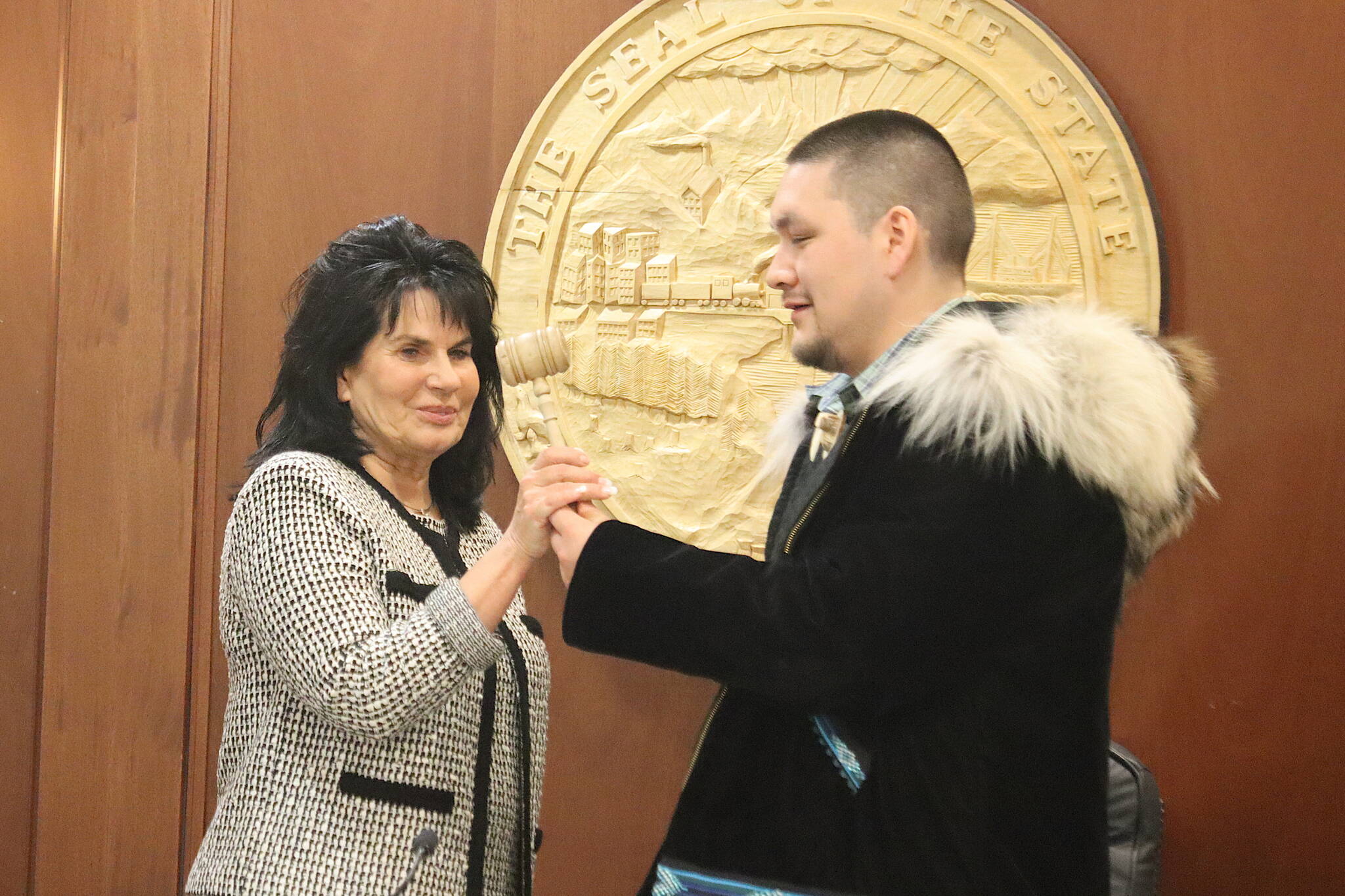This story has been updated to include additional information
Cathy Tilton, a Wasilla Republican, is the new speaker of the Alaska House after being chosen by a bipartisan 26-14 vote Wednesday, the second day of the legislative session, but the makeup of what appears to be the first Republican-led majority since 2017 remains an unknown that may not match the leadership vote.
The initial majority consists of 19 of the 21 Republicans elected in November, plus the four Democratic and independent members of the Bush Caucus, Tilton told reporters immediately after the floor session adjourned. That excludes members who voted for her, including Juneau Democrat Andi Story, former Speaker Louise Stutes, a Kodiak Republican, who presided over the previous bipartisan coalition, and David Eastman, a Wasilla Republican, who’s frequently been at odds with party leadership.
Story, in an interview shortly after the vote, said she supported Tilton because it became clear she had the votes to be speaker. The local representative, who was part of the previous bipartisan majority, said she does not expect to become part of the current coalition.
“I voted for her because I wanted to work with everybody,” she said.
When asked if her vote came with the hope of better committee assignments as a minority member, Story said she’s open to options that are discussed, without stating specifics. She also stated the makeup of the current majority may affect the chances of some legislation she considers a priority getting passed, but is still evaluating that situation.
Juneau’s other Democratic Rep. Sara Hannan, also a member of the previous majority, voted against Tilton as speaker.
In a contrary twist, Rep. Conrad “C.J.” McCormick, a Bethel Democrat, voted against Tilton although as a member of the Bush Caucus was included in those named as belonging to the new majority. He did not respond to a request for comment as of press time.
The House vote for Tilton avoids another long standoff for the House at the start of the session. A stalemate in 2019 took 31 days to resolve and another in 2021 took 24 days.
Her selection occurred after a nearly hour-long floor session consisting almost entirely of at eases during which various groups of lawmakers clustered to confer in the aisles and entrance to the chamber. Several names were nominated, which either were withdrawn after further at-ease discussions or the person named declined the nomination.
Tilton, who was the minority leader during the previous session and was seeking a Republican majority this year, said the makeup of initial majority has been a long-evolving process that essentially came together Tuesday. But that didn’t prevent Wednesday’s politicking.
“Any time there’s an election of a speaker there’s going to be a difference of opinion and people trying to put votes on the board, and that’s what was happening there,” she said.
As to whether any additional representatives opt to join the new majority, “I think that’s going to be a little bit of time to flush out,” Tilton said.
Rep. Dan Ortiz, a Ketchikan independent who voted in favor of Tilton, told the Anchorage Daily News he may be interested in joining the majority, while political blog The Alaska Landmine reported “several new majority members don’t seem to know who is in the majority when asked.”
Selected as the new minority leader following the floor session was Rep. Calvin Schrage, an Anchorage independent serving his second term who stated during the days before the session he was open to joining a Republican-led majority. In a prepared statement Wednesday afternoon, he said “we are committed to working together with other members of the House the Senate, and all Alaskans.”
“We look forward to working with fellow legislators on our priorities, including meaningful additions to the Base Student Allocation to ensure all of Alaska’s students have access to quality education, bolstering recruitment and retention of Alaska’s workers, investing in critical infrastructure, and charting a long-term fiscal plan that will set Alaska on a course for prosperity,” he said.
The next step for the House is a Committee on Committees that will determine assignments, with the naming of the finance co-chairs and rules chair likely to be among the indicators of which key members of the current majority were promised in return for supporting Tilton. The finance committee controls the budget and virtually all meaningful legislation, while the rules committee determines which bills reach the floor.
“I can safely say you’ll be able to see that tomorrow,” Tilton said.
The inclusion of the Bush Caucus is perhaps the most notable element, since the 21 Republicans in the House were unable to form a working majority during the months of discussions after the election. The caucus consists of former Speaker Bryce Edgmon, a Dillingham independent and past House speaker, Neal Foster, a Nome Democrat, Josiah Patkotak, an Utqiaġvik independent, and McCormick.
The caucus aligned with the bipartisian majority during the past two sessions, but Tilton said Republicans were able to offer an agenda that attracted the four lawmakers back into a previous alignment.
“The Bush Caucus has been in the majority with the Republicans several years previous to this,” Tilton said. “There was a little bit of time they were not. We are aligned on a lot of issues and a lot of this is issue based.”
Aside from noting “I think we can agree a priority this session is to deal with the financial stability of Alaska,” Tilton declined to state what promises were made to Bush Caucus members in return for their support.
“We don’t have any promises now that I can share with the group,” she said.
• Contact Mark Sabbatini at mark.sabbatini@juneauempire.com

